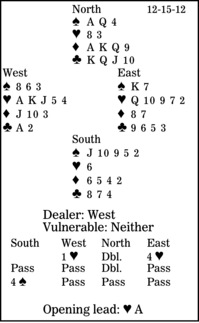Bridge column, December 15: Be realistic when on defense

In this deal, West is on defense against four spades. He leads the heart ace: three, two, six. How should he continue?
East jumped to four hearts as advised by the Law of Total Tricks. With 10 combined trumps and insufficient high-card power for game, jump immediately to the 10-trick level. (If his hand had 5-3-3-2 distribution, the bid would have been debatable because of the extra potential loser.) South passed, of course, but when North doubled for a second time to show a very strong hand, South ran to four spades. (Note that four hearts doubled would have gone down one.)
At the table, with no warning bell ringing, West might try to cash the heart king at trick two. Then, though, South would ruff and take the spade finesse. It would lose, but when declarer got back in, he would draw the missing trumps and concede only one spade, one heart and one club.
East's raise to four hearts promised five trumps. And if South has the spade king, the contract must be laydown. So, at trick two, West should cash his club ace. He should then continue with another club. And when East gets in with his spade king, he gives West a club ruff to defeat the contract.
** ** **
COPYRIGHT: 2012, UNITED FEATURE SYNDICATE
DISTRIBUTED BY UNIVERSAL UCLICK FOR UFS

